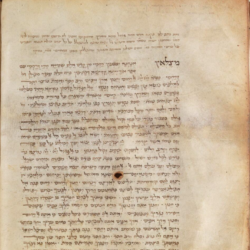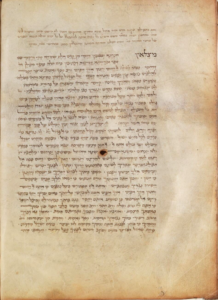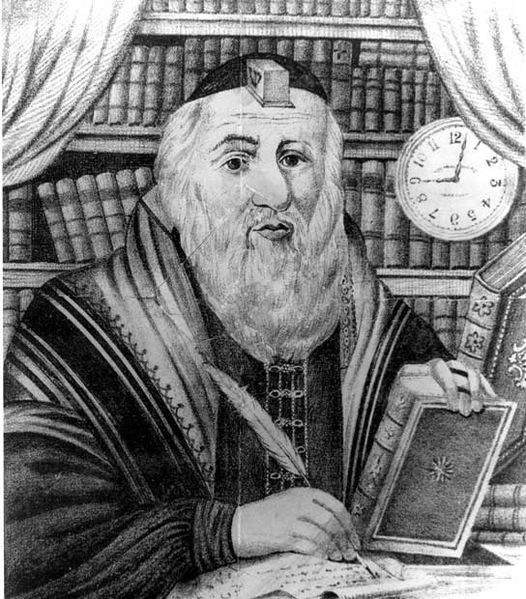Note: “The CAUSE” is used to translate the Divine Name YHVH, based on the philosophical idea of God as the Prime Mover and on the interpretation of the Name as a causative form of the copula – “causes to be.” This translation also uses the plural pronoun They to refer to God as a pluralis majestatis, and to avoid the implications of God being assigned a gender. (Find Ibn Ezra’s commentary on Genesis 1:1 for a discussion of the pluralis majestatis when referring to God.) All divine referents (pronouns, epithets, names) are rendered in unicase.
| Source (Hebrew and Aramaic) | Translation (English) |
|---|---|
וזהו שנוי שתקנו הגאונים ז״ל — באין י׳ בני אדם ובקי שבהם אוחז ספר תורה בידיו ואומר: |
And this is the name-change that the gaonim of blessed memory established: ten people come, and an expert among them holds a Torah scroll in his hands and says: |
מְצָלְאִין אֲנַֽחְנָא וְתִּבְעִין רַחֲמֵי מִן־קֳדָם אֱלָהָא שְׁמַיָּא מַרֵי דְּרַחֲמֵי עִם־סְפַר אוֹרָיְתָא קַדִּישָׁא דִּכְתִיבִין בֵּיהּ תְּלַת־עָשָׂר מְכִילָן דְּרַחֲמֵי — יְהֹוָ֣ה ׀ יְהֹוָ֔ה אֵ֥ל רַח֖וּם וְחַנּ֑וּן אֶ֥רֶךְ אַפַּ֖יִם וְרַב־חֶ֥סֶד וֶאֱמֶֽת נֹצֵ֥ר חֶ֙סֶד֙ לָאֲלָפִ֔ים נֹשֵׂ֥א עָוֺ֛ן וָפֶ֖שַׁע וְחַטָּאָ֑ה וְנַקֵּה֙ (שמות לד:ו-ז) — הוּא יִתְמַלֵּא רַחֲמִין עֲלַֽנָא וְעַל־אֲחַֽנָא וְעַל־כׇּל־עַמּוֹ יִשְׂרָאֵל וְעַל־רֹאשׁ הַחוֹלֶה הַזֶּה וִיקַיֵּם אוֹתוֹ לִרְפוּאָה שְׁלֵמָה וּלְחַיִּים טוֹבִים וַיִּקְרָא שְׁמוֹ פלוני. יִשְׂמַח בִּשְׁמוֹ לִרְפוּאָה שְׁלֵמָה, כְּדִכְתִיב — וַאֲגַדְּלָ֖ה שְׁמֶ֑ךָ וֶהְיֵ֖ה בְּרָכָֽה׃ (בראשית יב:ב) וּכְתִיב — וְלֹא־יִקָּרֵ֥א ע֛וֹד אֶת־שִׁמְךָ֖ אַבְרָ֑ם וְהָיָ֤ה שִׁמְךָ֙ אַבְרָהָ֔ם כִּ֛י אַב־הֲמ֥וֹן גּוֹיִ֖ם נְתַתִּֽיךָ׃ (בראשית יז:ה) |
We pray, and ask for mercy from the God of Heaven, the Master of Mercy, with the holy Torah scroll in which is written the thirteen measures of mercy: Cause, Cause, God, merciful and gracious, long-suffering and abounding in kindness and truth, guarding kindness for thousands, bearing iniquity and crime and sin and forgiving (Exodus 34:6-7) — may They be filled with mercy upon us and upon our brothers and upon all Their people Israel and upon the head of this sick person, and establish him to complete healing, to a good life, and call his name [new name]. May he rejoice in his name to complete healing as is written: “And I will greaten your name, and it will be a blessing.” (Genesis 12:2) And it is written: “No more will your name be called Avram, but your name will be Avraham, for a father of many nations I have given you.” (Genesis 17:5) |
יְהִי רָצוֹן מִלְּפָנֶֽיךָ יְהֹוָה אֱלֹהֵֽינוּ וֶאֱלֹהֵי אֲבוֹתֵֽינוּ שֶׁיְּהֵא שְׁמוֹ לְבַטֵּל מֵעָלָיו כׇּל־גְּזֵרוֹת קָשׁוֹת וְרָעוֹת, לִקְרֹֽעַ גְּזַר דִּינוֹ מֵעָלָיו וּמֵעַל כׇּל־אֲשֶׁר־לוֹ. וְאִם־נִקְנְסָה מִיתָה עַל פלוני זֶה, לֹא־נִקְנְסָה, וְאִם־נִגְזְרָה גְּזֵרָה רָעָה עַל פלוני זֶה, לֹא־נִגְזְרָה, דְּאִישׁ אַחֵר הוּא, וְכִבְרִיָּה חֲדָשָׁה הוּא, וּכְקָטָן שֶׁנּוֹלַד לְחַיִּים טוֹבִים וְלַאֲרִיכוּת שָׁנִים וּלְמִלּוּי יָמִים, וּלְקַיֵּם בּוֹ מִקְרָא שֶׁכָּתוּב — לֹא־יִהְיֶ֨ה מִשָּׁ֜ם ע֗וֹד ע֤וּל יָמִים֙ וְזָקֵ֔ן אֲשֶׁ֥ר לֹֽא־יְמַלֵּ֖א אֶת־יָמָ֑יו׃ (ישעיהו סה:כ) וְאוֹמֵר — שָׁמַ֙עְתִּי֙ אֶת־תְּפִלָּתֶ֔ךָ רָאִ֖יתִי אֶת־דִּמְעָתֶ֑ךָ הִנְנִי֙ רֹ֣פֶא לָ֔ךְ בַּיּוֹם֙ הַשְּׁלִישִׁ֔י תַּעֲלֶ֖ה בֵּ֥ית יְהֹוָֽה׃ (מלכים ב׳ כ:ה) |
May it be willed before You, Cause our God and God of our ancestors, that his name serve to nullify from him all harsh and evil decrees, and to tear his judged decree from upon him and from upon all that is his. And if death is penalized upon [old name], it is not penalized, and if an evil decree is decreed upon [old name], it is not decreed, as if this were a different man, like a new creation, or a small one born to a good life and long years and fullness of days, and to fulfill in him the verse that is written: “No more will there be a newborn infant or an elder who does not fill his days.” (Isaiah 65:20) And it says: “I have heard your prayer, I have seen your tears; behold I heal you! On the third day you will go up to the house of the Cause.” (II Kings 20:5) |
יְהִי רָצוֹן מִלְּפָנֶֽיךָ יְהֹוָה אֱלֹהֵֽינוּ וֶאֱלֹהֵי אֲבוֹתֵֽינוּ שֶׁתִּשְׁלַח רְפוּאָה שְׁלֵמָה לִפלוני זֶה מְהֵרָה, לִצְדָקָה וְלִזְכוּת, לְהִתְחַדֵּשׁ נְעוּרִים, לְחַדֵּשׁ מַעֲשִׂים טוֹבִים, לֶאֱכֹל הָעוֹלָם הַזֶּה, וְלִנְחֹל הָעוֹלָם הַבָּא, לְמַלֹּאות רְצוֹנְךָ, וְלִמְצֹא חֶפְצְךָ, וְלִמְצֹא חֵן בְּעֵינֶיךָ, לְהוֹדוֹת לְךָ וּלְבָרֵךְ אֶת־שִׁמְךָ כִּי טוֹב, וְאוֹמֵר — בָּרכִ֣י נַ֭פְשִׁי אֶת־יְהֹוָ֑ה וְאַל־תִּ֝שְׁכְּחִ֗י כׇּל־גְּמוּלָֽיו׃ הַסֹּלֵ֥חַ לְכׇל־עֲוֺנֵ֑כִי הָ֝רֹפֵ֗א לְכׇל־תַּחֲלוּאָֽיְכִי׃ הַגּוֹאֵ֣ל מִשַּׁ֣חַת חַיָּ֑יְכִי הַֽ֝מְעַטְּרֵ֗כִי חֶ֣סֶד וְרַחֲמִֽים׃ הַמַּשְׂבִּ֣יעַ בַּטּ֣וֹב עֶדְיֵ֑ךְ תִּתְחַדֵּ֖שׁ כַּנֶּ֣שֶׁר נְעוּרָֽיְכִי׃ (תהלים קג:ב-ה) וְאוֹמֵר — יוֹד֣וּ לַיהֹוָ֣ה חַסְדּ֑וֹ וְ֝נִפְלְאוֹתָ֗יו לִבְנֵ֥י אָדָֽם׃ וְ֭יִזְבְּחוּ זִבְחֵ֣י תוֹדָ֑ה וִיסַפְּר֖וּ מַעֲשָׂ֣יו בְּרִנָּֽה׃ (תהלים קז:כא-כב) |
May it be willed before You, Cause our God and God of our ancestors, that You send complete healing to this [new name] speedily, to righeousness and to merit, to renewal of youth, to new good deeds, to eat of this world, and to inherit the world to come, to fulfill Your will, to find Your favor, and to find grace in Your eyes, to thank You and bless Your name which is good, and it says: “Bless, my soul, the Cause, and do not forget all Their benefits! The One who forgives all your iniquities, heals of all your diseases, redeems of your life from the pit, encompasses you with kindness and compassion, satisfies your old-age with good, renews your youth like a griffon-eagle.” (Psalms 103:2-5) And it says: “They will thank the Cause for Their mercy, and Their wonders for the children of mortals. And they will offer thanksgiving-offerings, and tell of Their works in cheer.” (Psalms 107:21-22) |
This is a transcription and translation of a prayer for a change of name (in the event of a life threatening illness) appearing in J. B. De-Rossi, Mss. codices hebraici Biblioth I. B. De-Rossi (Parma, 1803), no. 483 (folio number: FL22509189).
Source(s)

“שנוי השם | Shinui ha-Shem, the healing ritual via name-change as reconstructed from “Sefer Toldot Adam v-Ḥava” by Rabbeinu Yeruḥam” is shared through the Open Siddur Project with a Creative Commons Attribution-ShareAlike 4.0 International copyleft license.








Comments, Corrections, and Queries